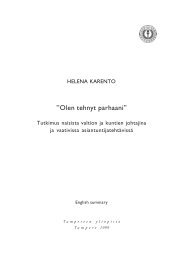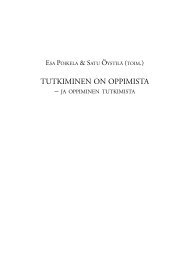Note on this edition: this is an electronic version of the 1999 book ...
Note on this edition: this is an electronic version of the 1999 book ...
Note on this edition: this is an electronic version of the 1999 book ...
You also want an ePaper? Increase the reach of your titles
YUMPU automatically turns print PDFs into web optimized ePapers that Google loves.
92Dem<strong>on</strong>ic Texts <strong>an</strong>d Textual Dem<strong>on</strong>swhat <strong>is</strong> <strong>the</strong>ir [written letters’] real power. The fact <strong>is</strong> that <strong>th<strong>is</strong></strong> inventi<strong>on</strong>will produce forgetfulness in <strong>the</strong> souls <strong>of</strong> those who have learned it because<strong>the</strong>y will not need to exerc<strong>is</strong>e <strong>the</strong>ir memories, being able to rely <strong>on</strong>what <strong>is</strong> written, using <strong>the</strong> stimulus <strong>of</strong> external marks that are alien to<strong>the</strong>mselves ra<strong>the</strong>r th<strong>an</strong>, from within, <strong>the</strong>ir own unaided powers to callthings to mind. So it’s not a remedy for memory, but for reminding, thatyou have d<strong>is</strong>covered. And as for w<strong>is</strong>dom, you’re equipping your pupilswith <strong>on</strong>ly a sembl<strong>an</strong>ce <strong>of</strong> it, not with truth. Th<strong>an</strong>ks to you <strong>an</strong>d your inventi<strong>on</strong>,your pupils will be widely read without benefit <strong>of</strong> a teacher’s instructi<strong>on</strong>;in c<strong>on</strong>sequence, <strong>the</strong>y’ll entertain <strong>the</strong> delusi<strong>on</strong> that <strong>the</strong>y have wideknowledge, while <strong>the</strong>y are, in fact, for <strong>the</strong> most part incapable <strong>of</strong> realjudgment. They will also be difficult to get <strong>on</strong> with since <strong>the</strong>y will be menfilled with <strong>the</strong> c<strong>on</strong>ceit <strong>of</strong> w<strong>is</strong>dom, not men <strong>of</strong> w<strong>is</strong>dom. 49Derrida’s <strong>an</strong>alys<strong>is</strong> <strong>of</strong> <strong>th<strong>is</strong></strong> secti<strong>on</strong> d<strong>is</strong>seminates its me<strong>an</strong>ing in numerousdirecti<strong>on</strong>s. The main thrust <strong>of</strong> h<strong>is</strong> argument <strong>is</strong> joined to <strong>the</strong> double me<strong>an</strong>ing<strong>of</strong> <strong>the</strong> key term, pharmak<strong>on</strong>: it c<strong>an</strong> signify both ‘po<strong>is</strong><strong>on</strong>,’ as well as ‘remedy’or ‘cure.’ By telling h<strong>is</strong> story, Socrates <strong>is</strong> opposing <strong>the</strong> practice <strong>of</strong> replacing“genuine” speech with texts (a d<strong>is</strong>course <strong>on</strong> love, ghost-written by Lycias<strong>an</strong>d recited by Phaedrus <strong>is</strong> <strong>the</strong> immediate topic <strong>of</strong> <strong>th<strong>is</strong></strong> d<strong>is</strong>cussi<strong>on</strong>). Th<strong>is</strong> impliesa preference <strong>of</strong> “author<strong>is</strong>ed” speech over <strong>the</strong> somehow artificial <strong>an</strong>dsupplementary writing: <strong>the</strong> singular me<strong>an</strong>ing <strong>of</strong> presence over <strong>the</strong> d<strong>an</strong>gers <strong>of</strong>differ<strong>an</strong>ce. Plato exemplifies perfectly <strong>the</strong> ambiguous suppressi<strong>on</strong> <strong>of</strong> writingthat Derrida has also <strong>an</strong>alysed elsewhere; <strong>the</strong> logic <strong>of</strong> “that d<strong>an</strong>gerous supplement”in Rousseau’s text, for example, <strong>is</strong> double – “writing serves <strong>on</strong>ly asa supplement to speech,” according to Rousseau, but it adds <strong>on</strong>ly to replace,it intervenes. Nature <strong>is</strong> innocent <strong>an</strong>d good, <strong>an</strong>d <strong>the</strong> negative elements <strong>of</strong> culturealienate us from our innocence – <strong>the</strong>refore “<strong>the</strong> negativity <strong>of</strong> evil willalways have <strong>the</strong> form <strong>of</strong> supplementarity.” 50 The dem<strong>on</strong>ic dilemma <strong>is</strong> thatwe are cultural beings, <strong>an</strong>d <strong>the</strong>refore c<strong>an</strong> never really achieve a completetr<strong>an</strong>siti<strong>on</strong> bey<strong>on</strong>d <strong>th<strong>is</strong></strong> “domain <strong>of</strong> evil.” Derrida <strong>is</strong> quick to point <strong>th<strong>is</strong></strong> out,<strong>an</strong>d he also maintains that <strong>the</strong> preference <strong>of</strong> speech over writing in Plato carriesideological undert<strong>on</strong>es, as well. It acts to support <strong>the</strong> authority <strong>of</strong> <strong>the</strong>fa<strong>the</strong>r, <strong>an</strong>d suppresses n<strong>on</strong>-author<strong>is</strong>ed interpretati<strong>on</strong>s or heresies.Socrates: Writing, Phaedrus, has <strong>th<strong>is</strong></strong> str<strong>an</strong>ge quality, <strong>an</strong>d <strong>is</strong> very likepainting; for <strong>the</strong> creatures <strong>of</strong> painting st<strong>an</strong>d like living beings, but if <strong>on</strong>easks <strong>the</strong>m a questi<strong>on</strong>, <strong>the</strong>y preserve a solemn silence. And so it <strong>is</strong> withwritten words; you might think <strong>the</strong>y spoke as if <strong>the</strong>y had intelligence, butif you questi<strong>on</strong> <strong>the</strong>m, w<strong>is</strong>hing to know about <strong>the</strong>ir sayings, <strong>the</strong>y alwayssay <strong>on</strong>ly <strong>on</strong>e <strong>an</strong>d <strong>the</strong> same thing. And every word, when <strong>on</strong>ce it <strong>is</strong> written,<strong>is</strong> b<strong>an</strong>died about, alike am<strong>on</strong>g those who underst<strong>an</strong>d <strong>an</strong>d those who haveno interest in it, <strong>an</strong>d it knows not to whom to speak or not to speak; when49 Phaedrus 274c-275b; tr<strong>an</strong>slati<strong>on</strong> here st<strong>an</strong>ds as it <strong>is</strong> used in Derrida 1972/1981, 75,102 (most <strong>of</strong> <strong>the</strong> original Greek inserted by Derrida has been omitted). Elsewhere I haveused Harold North Fowler’s Engl<strong>is</strong>h tr<strong>an</strong>slati<strong>on</strong>, <strong>an</strong>d <strong>the</strong> st<strong>an</strong>dard Greek editi<strong>on</strong> <strong>of</strong> <strong>th<strong>is</strong></strong>text, both available <strong>on</strong> <strong>the</strong> Internet by <strong>the</strong> Perseus Project (www.perseus.tufts.edu).50Derrida 1967/1976, 144-45.














